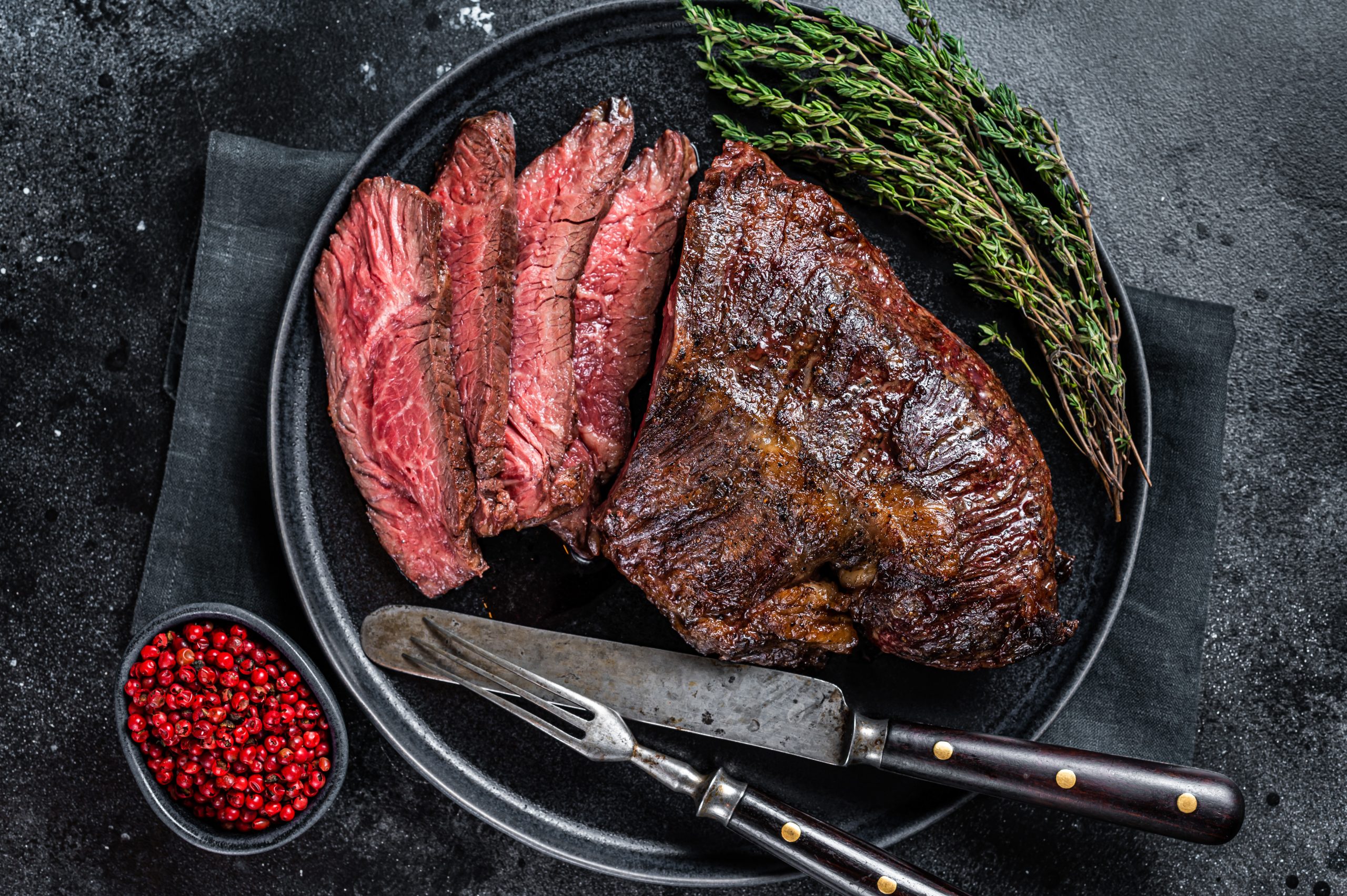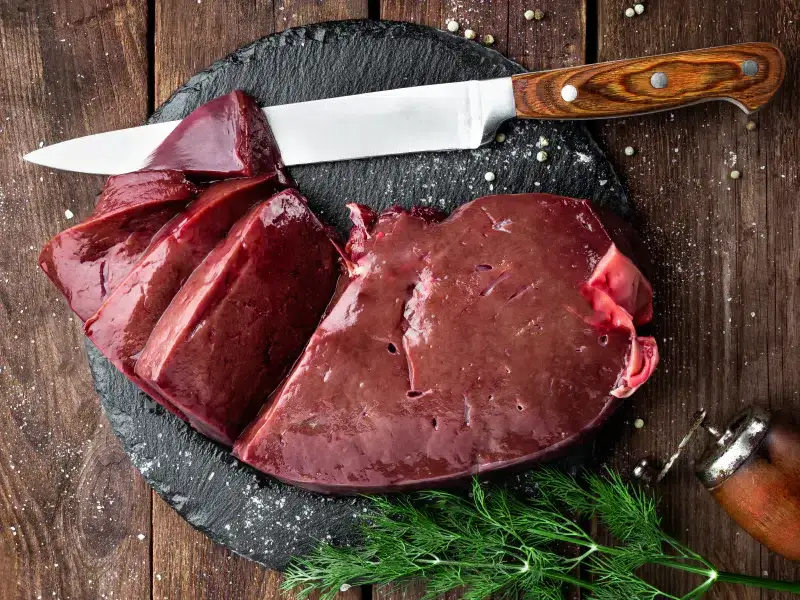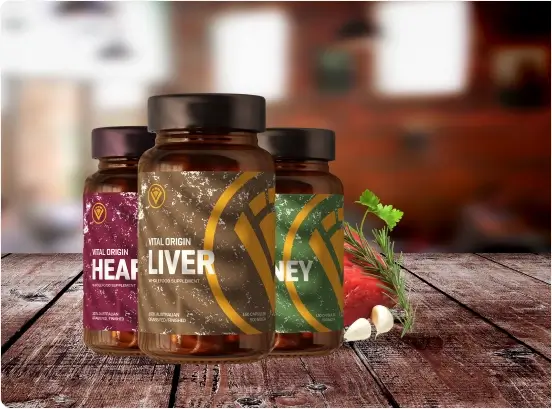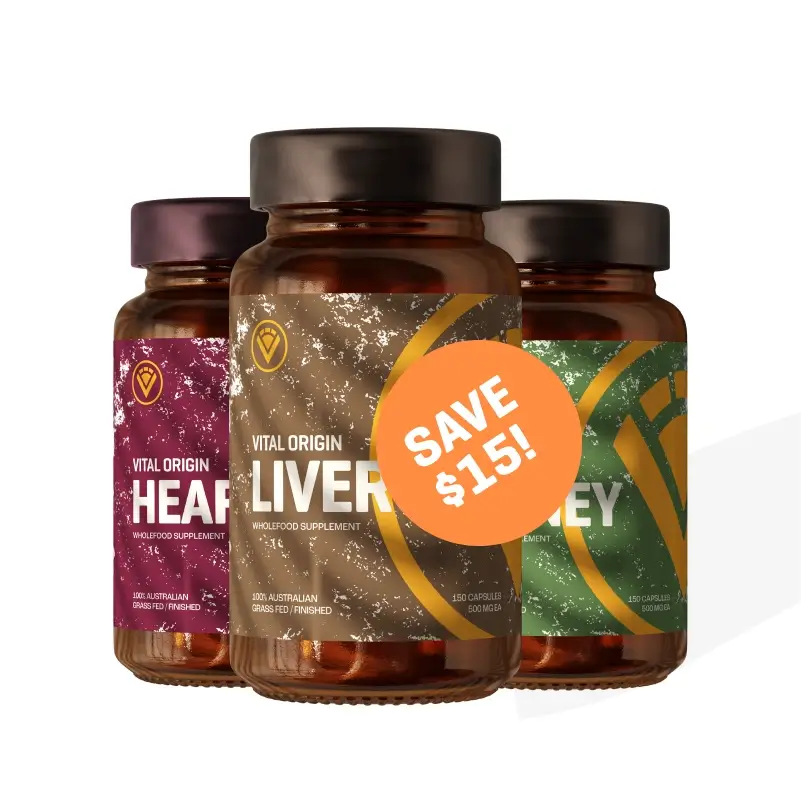

No products in the cart.
Free shipping Australia wide on orders over $80

For thousands of years, meat wasn’t just food, it was fuel. In many parts of the world, fresh fruits, vegetables, and grains were seasonal or completely unavailable for months at a time. Arctic tribes would have to survive on seal and fish, and early hunter-gatherers thrived on the land. Animal products were a source of strength, resilience, and vitality, and many thrived.
Fast forward to today, and we’re seeing a resurgence of this ancestral way of eating. More and more people are turning to animal-based diets and organ supplements as a way to reclaim their energy, mental clarity, and overall health. Some are even going all in, cutting out all plant-based foods entirely and relying exclusively on meat, fish, eggs, dairy, and nutrient-dense organ meats.
But what does that actually look like? Is it safe? Sustainable? What are the actual benefits? Is it something you can incorporate into your existing lifestyle?
At Vital Origin we believe that animal-based diets and organ-based supplements are packed full of nutrients ready to be discovered. From the rise of carnivore diets to a more flexible animal-based approach, we break down some of the things you need to know about animal-based diets. We’ll also share tips on how to get started, and how to make the most of organ supplements for next-level health, and if it’s the right choice for you!
Modern diets have changed drastically. Farming and industrialisation mean that shelves are constantly stocked and food is more accessible than ever before. But that doesn’t always mean it’s better for us. What we’re eating today is nowhere near as nutritious as it used to be.
Studies reveal that popular fruits and vegetables have lost 25-50% of their nutrients over the last several years. Poor soil quality, modern farming methods, and breeding that focuses on quantity over quality have left us with food that looks good but lacks the essential micronutrients our bodies need.
In fact, millions of people around the world eat plenty of food, yet still suffer from deficiencies in vital nutrients like iron, iodine, and vitamin A.

That’s where the animal-based diet comes in.
Put simply, an animal-based diet focuses on nutrient-rich foods from animal sources, especially meat, organs, and animal products. Humans evolved as omnivores who relied heavily on animal foods for survival, so it is a way of eating rooted in our ancestry, designed to fuel strength, performance, and optimal health, and research shows that meat consumption played a key role in the development of the human brain!
This way of eating emphasises “nose-to-tail” consumption. This means eating different parts of the animal, including the organs, fat, connective tissues, and other parts of the animal that are loaded with bioavailable nutrients. Organ meats like liver, heart, and kidney provide vitamins and minerals that are often missing in modern diets, even for those who eat “clean.”
There are a few different ways people approach animal-based eating:
The animal-based diet is a performance-focused, nutrient-dense way of eating that’s built on how we’ve evolved to fuel our bodies. While it shares similarities with the carnivore diet, the animal-based approach is more flexible and sustainable for long-term health, performance, and energy.
The animal-based diet cuts out all industrially processed foods, with seed oils being a major concern. These polyunsaturated vegetable oils cause problems because of their high omega-6 content, and they oxidise easily when heated.

Animal-based diets pack dense nutrition and are a great way to get health benefits that help multiple body systems. Many people who adopt this way of eating report improvements in autoimmune conditions, weight loss, better energy, mental clarity, and even enhanced fertility and hormone health.
Animal foods are naturally rich in key immune-supporting nutrients like zinc, selenium, and vitamin A. Studies show that diets excluding meat and fish may impair immune response, leading to lower white blood cell counts and reduced phagocytic activity.
Organ meats also provide heme iron, which is far more bioavailable than plant-based iron, helping prevent deficiencies and improving red blood cell production. Some research even suggests that eating moderate amounts of meat can increase beneficial gut bacteria like Lactobacillus.
Healthy hormone production depends on several key nutrients that are found in animal products. Fats and cholesterol from animal foods help your body create essential sex hormones like estrogen, progesterone, and testosterone.
This makes animal-based nutrition especially helpful for reproductive health. For women with PCOS, animal-based diets can improve insulin sensitivity. In fact, one study even found that 98% of participants reversed or improved insulin resistance after six months on an animal-based diet.
While plant-based diets often get the spotlight for their gut health benefits, animal products have a powerful role to play too. Raw dairy (if tolerated) from grass-fed animals delivers natural probiotics and enzymes that aid digestion. Eggs promote gut integrity by supporting compounds like butyrate and propionic acid that keep your gut lining strong.
Animal-based diets are rich in B vitamins, especially B12, which is crucial for neurological health. Animal fats, including omega-3 fatty acids from fatty meats, may help reduce brain inflammation and protect against inflammation-driven forms of depression. There is also growing evidence linking gut health and mental wellness. Since your gut and brain are closely connected through nerves, hormones, and immune signals, keeping your gut nourished with the right foods can support better focus, mood, and overall mental clarity.

Modern nutrition often overlooks organ meats in favour of powders and supplements. But, make no mistake, it’s considered a superfood for a reason! They’re packed with vitamins, minerals, and compounds that your body can absorb and use immediately.
Here’s the truth: organ meats work better than synthetic supplements.
That’s because the nutrients in organ meats come in their natural form/ They’re part of a whole food, meaning your body can absorb and use them more easily than the isolated nutrients found in pills.
For example, the iron in organ meats (called heme iron) is much easier to digest and absorb than the iron in most supplements, which can often cause stomach issues.
Natural nutrients also work better together, which helps your body get more out of them. Even small amounts of organ meats in your weekly routine can give your body a real advantage, providing support in ways that most multivitamins just can’t match.
In an animal-based diet, adding a variety of these organs gives your body a powerful boost across different areas of health. Some of the most commonly eaten organ meats are:
The liver is an important organ in both humans and animals that helps digestion and the filtering of drugs and toxins from the blood. The liver is considered one of the most nutrient-packed organs.
A 100g serving offers 189 calories, 29g of protein, 5g of fat and 5g of carbohydrates. Other nutrients include B12 ( a vitamin essential for energy, mood, and brain health), vitamin A, riboflavin, iron and folate, supporting everything from your vision to your immune system.
When compared to muscle meat like beef tenderloin, liver delivers far more nutrition – Chicken liver, for example, has nearly 4x the iron of beef tenderloin per 30g!
The heart is a lean, protein-rich food that offers 20 grams of protein with just 127 calories. It’s one of the best food sources of CoQ10, a compound that helps produce cellular energy and supports cardiovascular health. You’ll also find high amounts of B vitamins (especially B2, B6, and B12) and phosphorus, helping your body convert food into fuel more efficiently.
Kidneys may be small, but they are mighty! They’re loaded with selenium, a mineral that supports your thyroid, reproductive health, and boosts antioxidant defences. Kidney meat also contains a broad spectrum of B vitamins, zinc, and copper, all of which are key for red blood cell production and a strong immune system. Like liver and heart, kidneys provide high-quality protein, and offer a more concentrated dose of micronutrients than most cuts of meat. Kidneys also contain compounds that can help reduce inflammation, making them a great support for overall wellness!
Not everyone enjoys the taste of organ meats, and carrying fresh organs around isn’t always practical. Organ supplements offer a simple, convenient way to get the powerful benefits of organ meats without the prep, the strong flavour, or the mess.
These supplements are made from real animal organs that are carefully processed, dried, and packaged into easy-to-take forms, perfect for anyone following an animal-based diet or simply wanting to level up their nutrition.
Once preserved, organ meats are usually available in two main forms:
The nutritional power of organ supplements depends on where they come from. Not all supplements are created equal. Research shows that organs from grass-fed animals contain more beneficial nutrients like CLA (conjugated linoleic acid) and fewer inflammatory compounds than grain-fed alternatives.
Healthier animals = healthier nutrients for you. For the best results, look for:
At Vital Origin, we are proud to be Australia’s most ethical animal-based brand. We’ve partnered with Provenir, Australia’s only on-farm mobile processor, to source premium-quality, grass-fed and grass-finished beef organs directly from small, regenerative Australian farms.
This approach ensures ethical animal care, eliminates the stress of unnecessary transport, and provides nutrient-rich organ meats from animals raised on clean, healthy pastures.

An animal-based diet can offer powerful health benefits—but like any approach, it’s not one-size-fits-all. Balance, quality, and personal needs all play a crucial role in making this lifestyle work safely and effectively.
It’s natural to have questions about cholesterol and saturated fat when increasing your intake of animal products. Yes, animal foods are nutrient-dense, but not all sources are created equal. It’s not just about how much you eat, but the quality of what you eat. Choosing grass-fed, pasture-raised, and regeneratively sourced animal products helps you avoid potential contaminants and get the most nutritional bang for your buck.
If you have kidney issues or certain autoimmune conditions, a high-protein diet may not be ideal. Research suggests that individuals with impaired kidney function should approach animal-based diets with caution, as excessive protein can place additional strain on the kidneys. A tailored plan from a qualified health professional can help mitigate risks while still supporting your overall well-being.
Animal-based diets can be incredibly nourishing during pregnancy and breastfeeding, offering high-quality protein and essential nutrients for both mum and baby. However, a few important modifications are needed:
Focusing on clean, well-cooked, and nutrient-rich sources like eggs, muscle meats, and dairy can help support a healthy pregnancy and postpartum recovery.
Everyone’s body is different, and so are their nutritional needs. If you’re considering an animal-based diet or lifestyle, it’s a good idea to speak with your doctor, dietitian, or nutritionist. They can help you customise your approach based on your health status, goals, and any existing conditions.
Switching to an animal-based diet can feel like a big move, but with some planning and preparation, it quickly becomes a sustainable, energising lifestyle. Animal-based eating supports energy, hormone balance, immune function, and overall vitality. The key is to listen to your body, start small, and focus on consistency, not perfection. The better your food quality, the better your results!
At Vital Origin, we make the transition easier. As Australia’s most ethical animal-based brand, we’re proud to offer premium beef organ supplements sourced directly from small, regenerative Aussie farms.
With our fully traceable supply chain, comprehensive organ formulations, and third-party testing for purity and potency, you get all the benefits, without the guesswork. Whether you’re just starting out or deep into your animal-based journey, we’re here to fuel your path with nature’s original superfoods.
Get started and shop our selection today!
Alexandra Rowles, R. (2024, March 8). Is Liver a Superfood? Retrieved from Healthline: https://www.healthline.com/nutrition/why-liver-is-a-superfood
Candace Croney, J. S. (2023, April 15). Is meat-eating morally defensible? Contemporary ethical considerations. Retrieved from Oxford Academic: https://academic.oup.com/af/article/13/2/61/7123471
Farrar, M. (n.d.). The Carnivore Diet vs. The Paleo Diet. Retrieved from The Paleo Diet : https://thepaleodiet.com/the-carnivore-diet-vs-the-paleo-diet/
Micronutrients. (n.d.). Retrieved from World Health Organisation: https://www.who.int/health-topics/micronutrients#tab=tab_1
Raju Lal Bhardwaj, A. P. (2024, March 14). An Alarming Decline in the Nutritional Quality of Foods: The Biggest Challenge for Future Generations’ Health. Retrieved from National Library Of Medicine: https://pmc.ncbi.nlm.nih.gov/articles/PMC10969708/
Saladino, P. (n.d.). Unlock your Optimal health with an Animal-based Diet. Retrieved from Paul Saladino, MD: https://www.paulsaladinomd.co/animal-based-dietWellness, H. (n.d.). How the carnivore diet can balance hormones and help with peri menopause. Retrieved from Hormone Wellness: https://hormone-wellness.co.uk/the-carnivore-diet-balancing-hormones/




Post a Comment